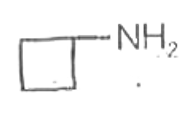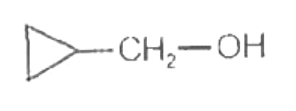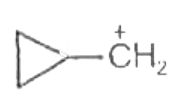A tertiary butyl carbocation is more stable than isopropyl carbocation. Justify.
To justify why a tertiary butyl carbocation is more stable than an isopropyl carbocation, we can follow these steps:
Step 1: Understand the Structure of the Carbocations
- Tertiary Butyl Carbocation: This carbocation has the structure (CH₃)₃C⁺. It consists of three methyl (CH₃) groups attached to a central carbon atom that carries a positive charge.
- Isopropyl Carbocation: This carbocation has the structure (CH₃)₂CH⁺. It consists of two methyl groups and one hydrogen atom attached to a central carbon atom that carries a positive charge.
Step 2: Identify the Type of Carbocations
- The tertiary butyl carbocation is classified as a tertiary carbocation because the positively charged carbon is bonded to three other carbon atoms.
- The isopropyl carbocation is classified as a secondary carbocation because the positively charged carbon is bonded to two other carbon atoms.
Step 3: Analyze Stability Factors
- Carbocation stability is influenced by the degree of substitution. Tertiary carbocations are generally more stable than secondary carbocations due to the ability of surrounding alkyl groups to donate electron density to the positively charged carbon atom.
- This phenomenon is known as hyperconjugation, where the adjacent C-H or C-C bonds can overlap with the empty p-orbital of the positively charged carbon, providing additional stability.
Step 4: Count the Number of Alpha Hydrogens
- In the tertiary butyl carbocation, there are nine alpha hydrogens (three from each of the three methyl groups).
- In the isopropyl carbocation, there are six alpha hydrogens (three from one methyl group and three from the other).
Step 5: Relate Alpha Hydrogen Count to Stability
- The stability of a carbocation is directly proportional to the number of alpha hydrogens it has. More alpha hydrogens mean more hyperconjugation, which stabilizes the positive charge.
- Since the tertiary butyl carbocation has more alpha hydrogens (nine) compared to the isopropyl carbocation (six), it is more stable.
Conclusion
- Therefore, the tertiary butyl carbocation is more stable than the isopropyl carbocation due to its higher degree of substitution, greater number of alpha hydrogens, and the resulting hyperconjugation that stabilizes the positive charge.
- Tertiary Butyl Carbocation: This carbocation has the structure (CH₃)₃C⁺. It consists of three methyl (CH₃) groups attached to a central carbon atom that carries a positive charge.
- Isopropyl Carbocation: This carbocation has the structure (CH₃)₂CH⁺. It consists of two methyl groups and one hydrogen atom attached to a central carbon atom that carries a positive charge.
- The tertiary butyl carbocation is classified as a tertiary carbocation because the positively charged carbon is bonded to three other carbon atoms.
- The isopropyl carbocation is classified as a secondary carbocation because the positively charged carbon is bonded to two other carbon atoms.
- Carbocation stability is influenced by the degree of substitution. Tertiary carbocations are generally more stable than secondary carbocations due to the ability of surrounding alkyl groups to donate electron density to the positively charged carbon atom.
- This phenomenon is known as hyperconjugation, where the adjacent C-H or C-C bonds can overlap with the empty p-orbital of the positively charged carbon, providing additional stability.
- In the tertiary butyl carbocation, there are nine alpha hydrogens (three from each of the three methyl groups).
- In the isopropyl carbocation, there are six alpha hydrogens (three from one methyl group and three from the other).
- The stability of a carbocation is directly proportional to the number of alpha hydrogens it has. More alpha hydrogens mean more hyperconjugation, which stabilizes the positive charge.
- Since the tertiary butyl carbocation has more alpha hydrogens (nine) compared to the isopropyl carbocation (six), it is more stable.
- Therefore, the tertiary butyl carbocation is more stable than the isopropyl carbocation due to its higher degree of substitution, greater number of alpha hydrogens, and the resulting hyperconjugation that stabilizes the positive charge.
Similar Questions
Knowledge Check
Which carbocation is the most stable ?
A B
B C
C D
D
Which carbocation is most stable
View SolutionThe carbocation which is most stable is
View Solutionp-methyl benzyl carbocation (I) is more stable than benzyl carbocation (II).
Heterovalent or no bond resonance.
View SolutionA:
 on raction with HNO2 gives
on raction with HNO2 gives  as major product.
as major product.
R: carbocation is more stable than
carbocation is more stable than  carbocation.
carbocation.
View SolutionThe most stable carbocation is
View SolutionThe most stable carbocation is
View SolutionThe most stable carbocation is
View Solution
